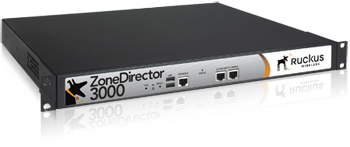Ruckus launches first mesh-based 802.11n WLAN

Ruckus Wireless has introduced what it says is the first wireless mesh-based 802.11n WLAN solution for small and medium businesses. According to Ruckus, its new SmartMesh technology enables a simple installation at half the cost of similar Wi-Fi networks, yet delivers improved performance.
SmartMesh builds on Ruckus’ Smart Wi-Fi technology, which employs intelligent beam-steering capabilities, to enable WLANs to self-organize, self-optimize, and self-heal, according to David Callisch, vice president of marketing for Ruckus. The solution is designed for companies with 20 to 1,000 employees that don’t have a lot of IT resources and may not have Ethernet drops installed throughout the location. When using SmartMesh, fewer access points require an Ethernet connection, and that allows for an easier installation because employees need only plug in the access point to an electrical outlet.
The mesh technology finds the best signal path and self-repairs when a node goes offline, which delivers a signal that “looks like it’s wired,” says Callisch. The omnidirectional antennas, which can “steer” Wi-Fi signals based on environmental changes, eliminate packet errors and increase reliability, which is essential for a mesh network to work properly.
Callisch says that meshing hasn’t been adopted by small to medium businesses because it hasn’t been fast enough, it costs too much, and is difficult to deploy. He says the new SmartMesh technology addresses all those issues. It uses the faster 802.11n standard, and the typical installation costs half as much as a similar setup using products from a vendor such as Cisco, he says. For instance, he cites a hotel in suburban Atlanta that installed a Ruckus SmartMesh WLAN for a total cost of $15,000; the same installation using equipment from Cisco, he says, would have cost $35,000. Ruckus installed 15 access points, and only five of those were wired to Ethernet, which saves on installation costs.
The SmartMesh technology runs on Ruckus’ ZoneDirector 1000 line of controllers. ZoneDirector 1000 supports a range of access points that starts at 6 and scales up to 50. The entry-level ZoneDirector is priced at $1,200. Ruckus also introduced the ZoneDirector 30000 series, which can support up to 250 access points. It will be available in July at a starting cost of $6,000 for 25 access points.
As for access points, Ruckus launched a new 802.11n AP with mesh support, the ZoneFlex 7942, which lists for $699 each.
